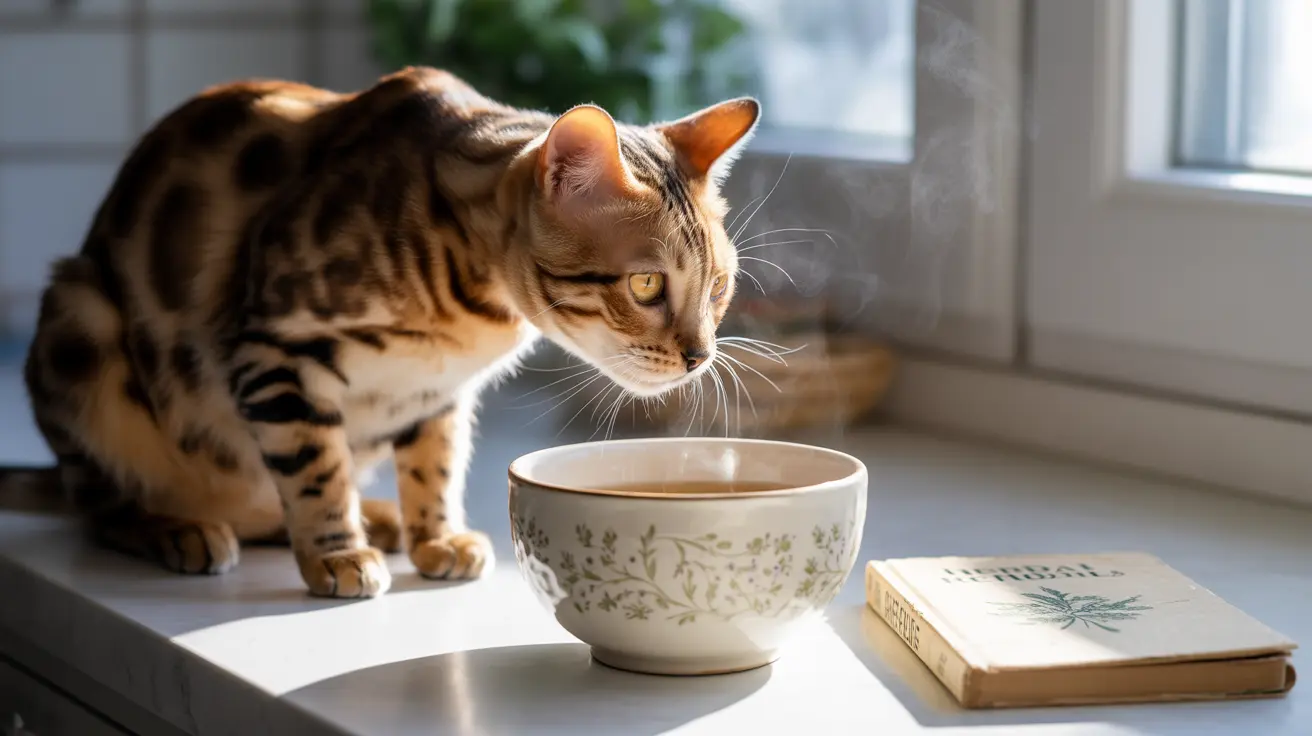If you're a cat owner who enjoys herbal tea, you might wonder about sharing the calming benefits of chamomile with your feline friend. However, it's crucial to understand that chamomile is toxic to cats and can pose serious health risks to your pet. This comprehensive guide will explore why chamomile poses dangers to cats, what symptoms to watch for, and how to keep your furry friend safe.
Understanding Chamomile Toxicity in Cats
Chamomile contains several compounds that are harmful to cats, including volatile oils like bisabolol, chamazulene, and anthemic acid. These substances, along with tannic acid, can cause various adverse reactions in felines. What makes this particularly concerning is that all parts of the chamomile plant - from flowers to stems and leaves - contain these toxic compounds.
Types of Harmful Chamomile Exposure
Cats can be exposed to chamomile through multiple sources:
- Fresh or dried chamomile plants
- Chamomile tea (both hot and cold)
- Essential oils and diffusers
- Herbal supplements
- Topical products containing chamomile
Signs of Chamomile Poisoning in Cats
When a cat ingests or comes into contact with chamomile, several symptoms may develop:
Immediate Symptoms
- Vomiting and diarrhea
- Excessive drooling
- Loss of appetite
- Skin irritation or dermatitis
Severe Reactions
- Blood clotting problems
- Increased bleeding tendency
- Depression and lethargy
- Behavioral changes
- Contact dermatitis
- Potential seizures in extreme cases
Prevention and Safety Measures
To protect your cat from chamomile poisoning, implement these essential safety measures:
- Keep all chamomile products in sealed containers
- Store tea bags and supplements in closed cabinets
- Avoid growing chamomile in your garden
- Never use chamomile essential oils around cats
- Be cautious with floral arrangements containing chamomile
Emergency Response to Chamomile Exposure
If you suspect your cat has ingested chamomile, take immediate action:
- Contact your veterinarian or pet poison control
- Do not induce vomiting without professional guidance
- Monitor your cat's symptoms
- Collect any remaining plant material or product for identification
- Be prepared to seek emergency veterinary care
Treatment Options
Treatment for chamomile poisoning typically includes:
- Supportive care with IV fluids
- Administration of activated charcoal
- Anti-nausea medications
- Blood clotting monitoring
- Specific treatments based on symptoms
Frequently Asked Questions
Is chamomile toxic to cats, and which parts of the plant are most dangerous?
Yes, chamomile is toxic to cats, and all parts of the plant are dangerous, including flowers, stems, leaves, and roots. Even processed forms like teas and essential oils can be harmful.
What symptoms indicate my cat has ingested chamomile or is suffering from chamomile poisoning?
Key symptoms include vomiting, diarrhea, excessive drooling, skin irritation, lethargy, and in severe cases, blood clotting problems or behavioral changes.
Can chamomile essential oils or teas harm my cat, and how should I prevent exposure?
Yes, both chamomile essential oils and teas can harm cats. Keep all chamomile products in sealed containers and stored in closed cabinets. Never use chamomile essential oils in diffusers around cats.
How should I respond if my cat eats chamomile—should I induce vomiting or go to the vet immediately?
Contact your veterinarian immediately. Don't induce vomiting unless specifically instructed by a professional, as this could cause additional harm.
Are there safer alternative calming remedies recommended for cats instead of chamomile?
Yes, there are many vet-approved calming aids specifically designed for cats. Consult your veterinarian for safe alternatives such as prescription medications, pheromone products, or specific cat-safe supplements.
Remember, while chamomile might be beneficial for humans, it's crucial to keep this plant and its products away from your feline companions. Always consult with your veterinarian about safe, cat-appropriate alternatives for any health concerns you might have about your pet.






